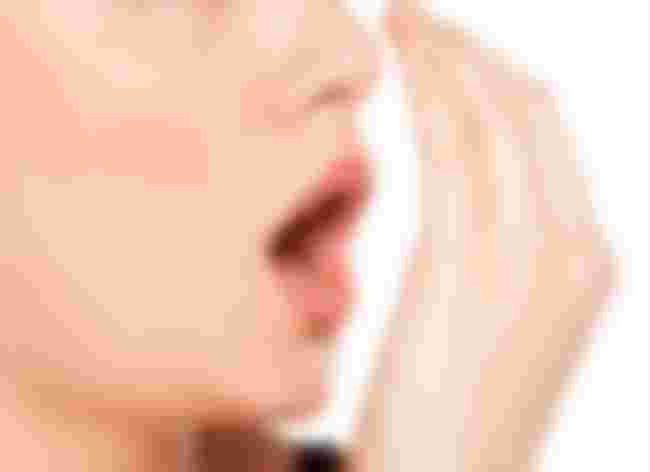Halitosis affects about 50 - 60% of the population irrespective of the gender and age. Halitosis influences a person's way of life negatively as it leads to low self esteem and social withdrawal.
About 90% of cases , the causative agents of halitosis arises from intra-oral sources like dry mouth and many more, Though it was believed to be mainly as a result of problems associated with gastrointestinal tracts diseases.
Table of content;
1.1 What is Halitosis?
1.2 Types of Halitosis.
1.3 Causes of Halitosis.
1.4 Test for Halitosis.
1.5 Symptoms of Halitosis.
1.6 Treatment of Halitosis.
1.7 Prevention of Halitosis.
1.8 Conclusion.
1.1 What is Halitosis?

Halitosis is seen as unpleasant odour from the oral cavity. It Is the general term used to describe any unpleasant odour of breath, irrespective of its origin. Halitosis is also known by the following terms; bad breath, oral malodour, mouth odour and Foetor Oris.
The word halitosis has both Latin and Greek origin (halitosis; from Latin halitus - breathe and Greek osis - disease) .
Halitosis is the third most common dental diseases, aside from tooth decay and gum diseases.
Bad breath is not an independent disease but a sign of the presence of diseases affecting the oral cavity and the digestive organs.
1.2 Types of Halitosis.
Clinically, Halitosis is grouped into three;
1. Genuine Halitosis : this is the type of halitosis that can easily be detected, using some testing methods like the organoleptic testing method or the use of volatile sulphur compounds.
The main cause of genuine halitosis is the presence of debris on the posterior portion of the tongue.
Genuine halitosis is further divided into;
● Pathologic Halitosis: This subgroup of genuine halitosis is caused or elevated by a disease. It is further grouped into oral and extra-oral pathologic Halitosis. The former is caused by diseases associated with the tissues found in the mouth while the later is caused by diseases associated with tissues from other parts of the body other than the mouth.
● Physiologic Halitosis: This type of halitosis is caused by the decay of organic matter in the oral cavity.
Genuine halitosis is the most common form of halitosis.
2. Pseudo-Halitosis : This is the condition where an individual assumes they have halitosis but in real sense, they do not have ( after undergoing test for halitosis).
Such cases requires counselling.
3. Halitophobia : This refer to the condition where a patient's assumption of a breath problem continues to exist despite being treated in cases of genuine Halitosis or after receiving counselling in cases of pseudo-halitosis. This type of Halitosis is also referred to as persistent psychological halitosis.
The New Classification divides Halitosis into five groups;
1. Type 1 Halitosis - Oral Halitosis (Originates from the oral cavity)
2. Type 2 Halitosis - Airway Halitosis ( originates from the respiratory tract)
3. Type 3 Halitosis - Gastroesophageal Halitosis ( Originates from the stomach)
4. Type 4 Halitosis - Blood-borne Halitosis ( Type of Halitosis which occurs when volatile compounds in the systemic circulation is transfer to exhaled breath during alveolar gaseous exchange)
5. Type 5 Halitosis - Subjective Halitosis ( it is same as the pseudo-halitosis)
1.3 Causes of Halitosis

Volatile molecules are the main causes of halitosis, such molecules could have oral or non-oral source. They include sulphur compounds and Amines compound.
Clinically, causes of Halitosis are divided into two main categories;
Internal and External factors.
1. Internal Factors : Factors within the body. They include;
● Poor oral hygiene: Inadequate attention to your oral and the use of in appropriate toothpaste exposes one to Halitosis. After meals the mouth should be properly rinse to avoid accommodation of food particles with the oral cavity.
● Unhealthy diet, bad habits such as smoking and diseases of the gum such as gingivitis and periodontitis are one of the major causes of Halitosis.
● Dryness of the mouth.
● Actions of bacteria on food particles in the oral cavity, producing odorous compounds.
● Volatile compounds such sulphur compounds, aromatic compounds, amines, ketones and aliphatic compounds in the oral cavity also causes halitosis.
● Oral cancer and ulcerations.
● Bowel obstruction : In this condition, you breath smells like faeces.
● Aspiration pneumonia.
2. External Factors : Factors outside the body. They include;
● Excessive tobacco intake.
● Excessive intake of alcohol.
● The use of certain drugs like diuretics, antihistamines and tranquilizers .
● Spicy and oily food.
● Excessive intake of sugary food without washing/rinsing the mouth after such meals.
1.4 Test for Halitosis
The following test are used for diagnosing halitosis;
1. Organoleptic test : In this method, halitosis is tested by smelling the breathe of a person with suspected directly.
2. Halimeter : It is used in testing for sulphur compounds.
3. Gas chromatography : This method is used in measuring three volatile sulphur compounds , they include Methyl mercaptan, Hydrogen Sulphide and Dimethyl Sulphide.
4. Beta-Galactosidase Test : It is used to measure the level of the enzyme called beta-galactosidase, which also causes mouth odour.
5. The Floss Test : This method is used to test for Halitosis in between the teeth.
Other methods include; salivary incubation tests, chemical sensor test and the BANA test.
1.5 Symptoms of Halitosis.
1. Whitish or yellowish plaque on the tongue.
2. Unpleasant mouth odour.
3. Pain and swelling of the mucosa membrane of the tongue.
4. Bleeding gums.
1.6 Treatment of Halitosis
1. Visit the dentist.
2. Identify the cause of the halitosis.
3. Complete treatment of diseases of the oral cavity.
4. Counselling for people with pseudo-halitosis and halitophobia.
5. Cases linked with other pathological origin, specialists of
6. Drugs used for treatment should be supervised by doctor.
7. Halitosis linked to other causes should referred to related specialists.
1.7 Prevention of Halitosis.
1. Drink enough water.
2. Floss after meals.
3. Avoid excessive alcohol and tobacco intake.
4. Brush your mouth regularly.
5. Avoid too much intake of garlic, onions and other spicy food.
1.8 Conclusion
Always remember that the use of fashionable mouthwash, delicious chewing gum will not give any long lasting positive result and will not help get rid of bad breath, visit the dentist for proper treatments.

